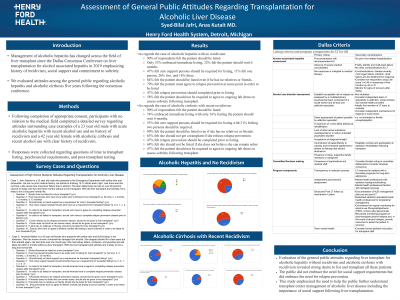Monday Poster Session
Category: Liver
P2954 - Assessment of General Public Attitudes Regarding Transplantation for Alcoholic Liver Disease
Monday, October 28, 2024
10:30 AM - 4:00 PM ET
Location: Exhibit Hall E

Has Audio
- SJ
Syed-Bilal Jafri
Henry Ford Health
Detroit, MI
Presenting Author(s)
Syed-Bilal Jafri, , Anas Kutait, MD
Henry Ford Health, Detroit, MI
Introduction: Management of alcoholic hepatitis has changed across the field of liver transplant emphasizing history of recidivism, social support and commitment to sobriety. We evaluated attitudes among the general public regarding alcoholic hepatitis and alcoholic cirrhosis five years following the alcoholic liver disease consensus conference.
Methods: Participants with no relation to the medical field completed a detailed survey regarding attitudes surrounding case examples with acute alcoholic hepatitis with recent alcohol use and no recidivism and alcoholic cirrhosis and recent alcohol use with clear history of recidivism. Responses were collected regarding time to transplant listing, psychosocial requirements, and post-transplant testing.
Results: As regards alcoholic hepatitis with no recidivism, 90% of respondents felt patients should be listed, but only 53% embraced immediate listing, 32% felt patients should wait 6 months. 47% felt zero support persons should be required for listing, 11% felt one person, 26% two, and 16% three. 84% felt patients should be listed even with no relatives or friends. 79% felt patients must agree to relapse prevention at some point to be listed, 47% felt relapse prevention should completed prior to listing. 58% felt patients should not be required to agree to ongoing lab draws to assess sobriety following transplant.
As regards alcoholic cirrhosis with recent recidivism, 90% of respondents felt patients should be listed, 74% embraced immediate listing with 16% wanting 6 months wait time. 53% felt zero support persons should be required. 90% felt patient should be listed if they can produce no social support. 63% felt they should not get transplant if refusing relapse prevention, 47% felt relapse prevention should be completed prior to listing. 68% felt they should not be listed if they feel unable to remain sober. 47% felt patient should not be required to agree to ongoing lab draws to assess sobriety following transplant.
Discussion: Evaluation of the general public attitudes regarding liver transplant for alcoholic hepatitis without recidivism and alcoholic cirrhosis with recidivism revealed strong desire to list and transplant these patients. The public did not embrace need for social support requirements but did embrace need for relapse prevention. This study emphasizes room for public education regarding management of alcoholic liver disease including the importance of social support following liver transplantation.
Disclosures:
Syed-Bilal Jafri, , Anas Kutait, MD. P2954 - Assessment of General Public Attitudes Regarding Transplantation for Alcoholic Liver Disease, ACG 2024 Annual Scientific Meeting Abstracts. Philadelphia, PA: American College of Gastroenterology.
Henry Ford Health, Detroit, MI
Introduction: Management of alcoholic hepatitis has changed across the field of liver transplant emphasizing history of recidivism, social support and commitment to sobriety. We evaluated attitudes among the general public regarding alcoholic hepatitis and alcoholic cirrhosis five years following the alcoholic liver disease consensus conference.
Methods: Participants with no relation to the medical field completed a detailed survey regarding attitudes surrounding case examples with acute alcoholic hepatitis with recent alcohol use and no recidivism and alcoholic cirrhosis and recent alcohol use with clear history of recidivism. Responses were collected regarding time to transplant listing, psychosocial requirements, and post-transplant testing.
Results: As regards alcoholic hepatitis with no recidivism, 90% of respondents felt patients should be listed, but only 53% embraced immediate listing, 32% felt patients should wait 6 months. 47% felt zero support persons should be required for listing, 11% felt one person, 26% two, and 16% three. 84% felt patients should be listed even with no relatives or friends. 79% felt patients must agree to relapse prevention at some point to be listed, 47% felt relapse prevention should completed prior to listing. 58% felt patients should not be required to agree to ongoing lab draws to assess sobriety following transplant.
As regards alcoholic cirrhosis with recent recidivism, 90% of respondents felt patients should be listed, 74% embraced immediate listing with 16% wanting 6 months wait time. 53% felt zero support persons should be required. 90% felt patient should be listed if they can produce no social support. 63% felt they should not get transplant if refusing relapse prevention, 47% felt relapse prevention should be completed prior to listing. 68% felt they should not be listed if they feel unable to remain sober. 47% felt patient should not be required to agree to ongoing lab draws to assess sobriety following transplant.
Discussion: Evaluation of the general public attitudes regarding liver transplant for alcoholic hepatitis without recidivism and alcoholic cirrhosis with recidivism revealed strong desire to list and transplant these patients. The public did not embrace need for social support requirements but did embrace need for relapse prevention. This study emphasizes room for public education regarding management of alcoholic liver disease including the importance of social support following liver transplantation.
Disclosures:
Syed-Bilal Jafri indicated no relevant financial relationships.
Anas Kutait indicated no relevant financial relationships.
Syed-Bilal Jafri, , Anas Kutait, MD. P2954 - Assessment of General Public Attitudes Regarding Transplantation for Alcoholic Liver Disease, ACG 2024 Annual Scientific Meeting Abstracts. Philadelphia, PA: American College of Gastroenterology.
